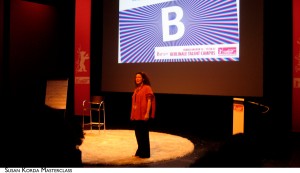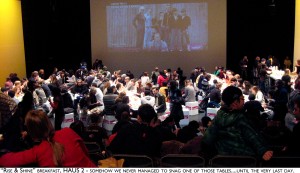Rise & Shine with Berlinale Talent Campus 2011
The 9th Berlinale Talent Campus (BTC) took place February 12-17 2011, in Berlin as part of the International Film Festival, now in its 61st year. The lucky group of 350 participants who gathered in Berlin, were selected from over 4000 applications and hailed from 88 different countries. The purpose of BTC is to bring together up-and-coming filmmakers and around 150 experts for a series of masterclasses, workshops and networking events over the course of six days.
 I was one of the lucky ones, and together with two filmmaker friends from Edinburgh, I made my way to Berlin on 11 February. Not only did BTC cover the cost of our flight, they also put us up in a city-centre hostel. It was a nice place, but we didn’t have very much time to spend there as BTC is 6 days of intense attending and socializing. I don’t think I made it to bed before 2am every single night.
I was one of the lucky ones, and together with two filmmaker friends from Edinburgh, I made my way to Berlin on 11 February. Not only did BTC cover the cost of our flight, they also put us up in a city-centre hostel. It was a nice place, but we didn’t have very much time to spend there as BTC is 6 days of intense attending and socializing. I don’t think I made it to bed before 2am every single night.
Everyday of BTC begins with a “Rise & Shine” breakfast, and an opportunity to sit with fellow Campers and perhaps meet someone new. It's hard to meet all 347 people at once, and it takes time to work your way through the crowd. But even before breakfast, it was essential to queue for tickets for events of that day and the next. Often the most popular of these events were sold out before we even reached the desk. Tickets for films were the hardest to come by.
The Campus put on shuttle buses which would take us from the hostel to the Campus headquarters in HAU 1, a theatre in the Kreuzberg area of the city. Every day there were a range of events to attend from 11 am to 5 pm, including such topics as post production, editing, filming war, interviews with producers, as well as In The Limelight sessions with such luminaries as Isabella Rossellini, Ralph Fiennes and Harry Belafonte. All were in Berlin to launch projects or films, and there was also a session called New Horizons in 3D co-presented by Wim Wenders, in Berlin for the premiere of his film Pina, a 3D dance film and tribute to the late Pina Bausch, the extraordinary German dancer and choreographer.
There were also Meet The Experts sessions, and everyone was given a chance to meet someone in a smaller group situation, and Experts on hand were people such as: Hanne Skjødt, Network Manager at European Documentary Network (EDN), Isabel Arrate Fernand who runs the Jan Vrijman Fund of IDFA, Michel Reilhac, Executive Director of ARTE France Cinema and Director of Film Acquisitions for ARTE France and many many more.
As well as the general BTC there were a number of special training programmes which one could apply for, once accepted by BTC. These included Doc Station, for those with feature documentaries in development, Editing Studio, a hands-on editing workshop, for participants with a project at the rough cut stage, as well as programmes for film critics, actors, scripts writers and composers. This year, Michael Nyman, the veteran film composer led the Score workshop which was also a competition, the winner receiving a chance to record with the German Film Orchestra Babelsberg and also final mixing and mastering sessions.
I would recommend these programmes to those interested in the Talent Campus. I think that you got much more out of hands-on sessions than many of the sessions offered at BTC, which can be rather basic or allow only limited interaction with the presenters.
So it was a special treat to be included in a small group who volunteered their time to sit in on some rough cuts for the Editing Studio and offer feedback at a session with Susan Korda, an American editor of documentaries and feature films.

- Susan gave a masterclass entitled “Kill Your Darlings” which as the title suggests, is about refining and making the right choices for your film at the editing stage. At the end of the masterclass, she asked for volunteers to sit in at said session the following day, and I was lucky enough, along with Mariana Oliva (a Brazilian filmmaker currently residing in Edinburgh) to be a part of this session. Scheduled for 3 hours, we ended up spending 5 hours with Susan and a few others crammed into an edit room with three director/editors who had brought their short films to Berlin for in-depth critical feedback. I would say that this was the highlight of the week for me, as it was a chance to take part in something concrete and in many ways was more of an extension of the Masterclass.
Of course, a big and important part of BTC is the actual networking with other Campers, or as they prefer, Talents. Each day there was a special “speed dating” sessions which were specifically geared towards a dream match – e.g. director/producers, directors/actors, and so on. There was a bit of a complaint that there were more directors at BTC than anything else, which I think reflects the ego-driven nature of filmmaking, and certainly the male/female ratio at BTC, with the former predominant, also makes for interesting “speed dating” of the traditional variety.
Last but not least, what was really amazing about BTC was meeting filmmaking from all over the world, and realising that all of these talented people are making films, not just short films, but features, despite the odds against them; many are coming from countries where there is little to no support for filmmaking. Filmmakers from Egypt, Tunisia, Ethiopia, Pakistan, Bangladesh - just a few countries of filmmakers I met who are actively making films.
Then of course, there are the parties. On the first night we were invited to the Finnish Film Commission party due to an entirely random meeting in a railway station with Lotta-Kaisa Riistakoski, a Finnish friend who was there as part of the FFC. Then there was the Brazilian party, Scottish drinks, the Miranda July post-premiere party, and the best of all was the final night BTC party. Lots of beer, wine and dancing, and of course, more networking!
As to the films, we did manage to squeeze into a few. Tickets at Berlinale are as rare as an Arctic buzzard. I was happy to see An African Election by Jarreth Merz which I missed at IDFA (after a personal invitation from the man himself). Well worthwhile. Totally engaging. Amazing access and great editing. I also managed to see a couple of the Berlinale Shorts programmes. These were very popular and one screening involved a very long time in a queue, the other involved actually buying a ticket! But it was worth it to see Spike Jonze’s Scenes from The Suburbs, a collaboration with Arcade Fire, set in a US suburb, near-future, fascist police state – hmmm… some would say that it’s already happening… Anyway, beautifully shot, great music, sweet and poignant.
I would highly recommend BTC to anyone who would like to get a global perspective on filmmaking as well as a major chance to schmooze with the biggest and brightest in the industry today.
Anne Milne is an award-winning Scottish filmmaker whose career has spanned several decades and continents. In addition to being a Director and Editor, Anne has produced web based content and video games, and taught New Media for a number of years in California. Her current passion is meeting people in obscure places doing interesting things. She has just completed a two-year MFA in Film Directing at the Edinburgh College of Art.
For Berlinale's official round-up on BTC go to http://www.berlinale-talentcampus.de/campus/event/coverage
Do you like this page?

